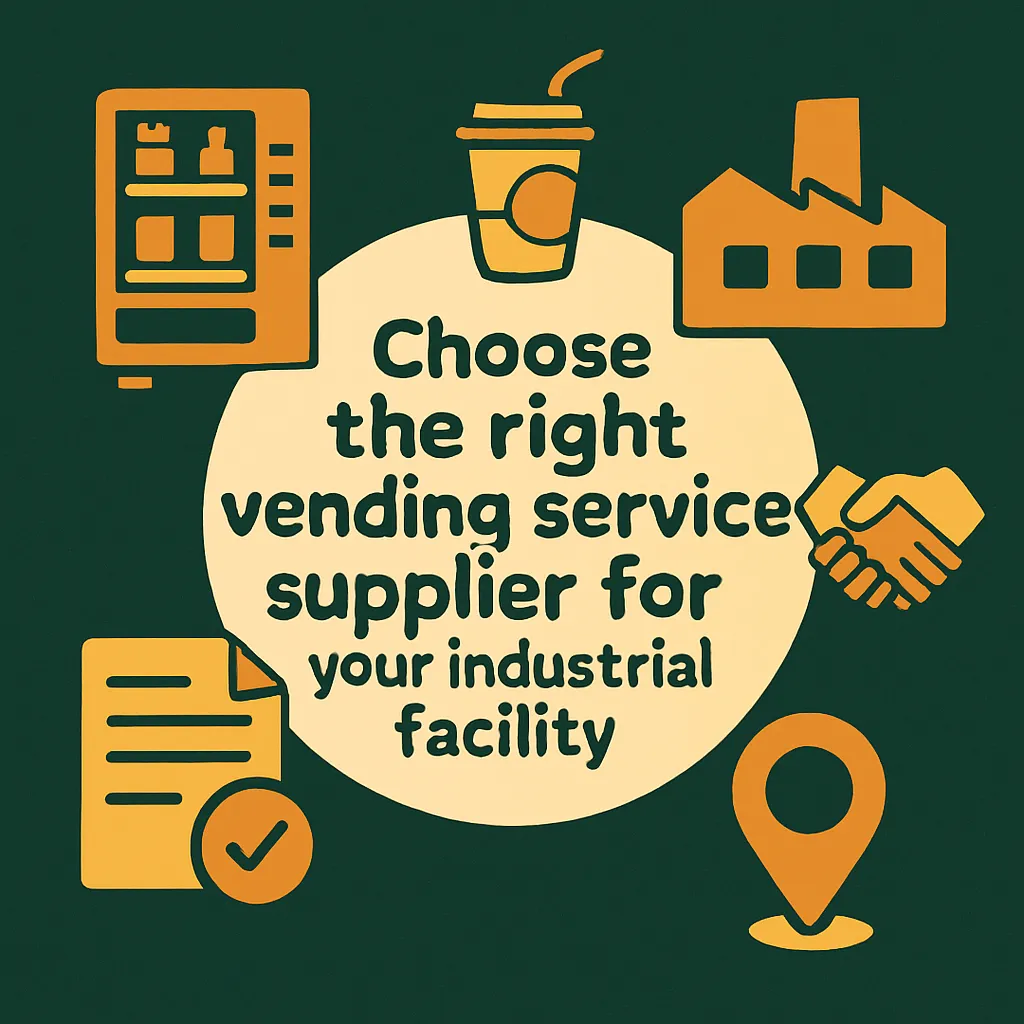Supplier Selection for Industrial Vending Services
Choose the right vending service supplier for your industrial facility. Learn key criteria for evaluating vendors, contracts, and service level agreements.
Back to Vending for Warehouses ResourcesChoose the right vending service supplier for your industrial facility. Learn key criteria for evaluating vendors, contracts, and service level agreements.
Back to Vending for Warehouses ResourcesSelecting the right vending supplier for an industrial facility involves more than just product choices; it demands a provider who understands the unique operational demands and safety requirements of these environments.
![]() Evaluate supplier's experience with heavy-duty equipment and industrial settings.
Evaluate supplier's experience with heavy-duty equipment and industrial settings.
![]() Confirm flexible product offerings, including PPE and industrial consumables.
Confirm flexible product offerings, including PPE and industrial consumables.
![]() Prioritize quick service response and reliable restocking to minimize downtime.
Prioritize quick service response and reliable restocking to minimize downtime.

In demanding industrial environments, the right vending service can significantly boost operational efficiency and employee satisfaction. Effective supplier selection for industrial vending services goes beyond basic snack and beverage offerings. It requires a meticulous evaluation process to ensure the vending program aligns with the facility’s unique needs, safety standards, and economic goals.
Industrial settings, such as manufacturing plants or warehouses, present distinct challenges. Factors like heavy machinery, dust, temperature extremes, and round-the-clock operations necessitate robust vending solutions. Therefore, a prospective supplier must demonstrate experience with equipment built for durability and reliability in challenging conditions. Look for suppliers who specialize in heavy-duty vending machines for industrial facilities, specifically those designed to withstand continuous use and harsh surroundings.
Beyond traditional refreshments, industrial vending often includes essential items like Personal Protective Equipment (PPE), small tools, first-aid supplies, and common industrial consumables. A top-tier supplier should offer a customizable product selection that caters directly to these specialized needs, ensuring workers have immediate access to what they need, when they need it. Furthermore, their service model should accommodate varying shift schedules, providing timely restocking and maintenance. Transparent service level agreements explained are critical for ensuring clarity on response times and performance metrics.
Modern industrial vending relies heavily on technology. Suppliers should offer machines equipped with telemetry for remote monitoring, enabling proactive restocking and fault detection. Cashless payment systems are also essential for convenience and hygiene. When evaluating potential partners, carefully review contract terms. Focus on flexibility, early termination clauses, and clear commission structures. Understanding questions to ask before signing a vending contract is vital to securing a favorable and sustainable partnership.
Key criteria include machine durability, product variety relevant to industrial needs, service reliability, technology integration, and flexible contract terms.
Extremely important. Industrial environments are often harsh, so machines must be robust enough to withstand heavy use, dust, temperature variations, and potential impacts.
Beyond standard snacks and drinks, they should offer PPE, tools, safety gear, first-aid items, and industrial consumables, relevant to the facility's operations.
Industrial facilities often operate 24/7, requiring suppliers to offer flexible restocking schedules, rapid response times for service issues, and transparent reporting.
Modern industrial vending should include telemetry for remote monitoring, cashless payment systems, and inventory management software to optimize operations and reduce downtime.
Industrial operations can fluctuate, so contracts should allow for adjustments in machine placement, product mix, and service levels without punitive penalties.
Absolutely. Suppliers with proven experience in industrial environments understand specific safety protocols, operational needs, and product demands, leading to better service.
Inquire about their typical response times for repairs, availability of spare parts, frequency of preventative maintenance, and clarity of communication channels.
Yes, many suppliers offer advanced inventory management systems that track usage, automate reordering, and provide data insights to optimize stock levels and reduce waste.
Contact other industrial clients directly. Ask about service reliability, product quality, responsiveness to issues, and overall satisfaction with the supplier's performance.